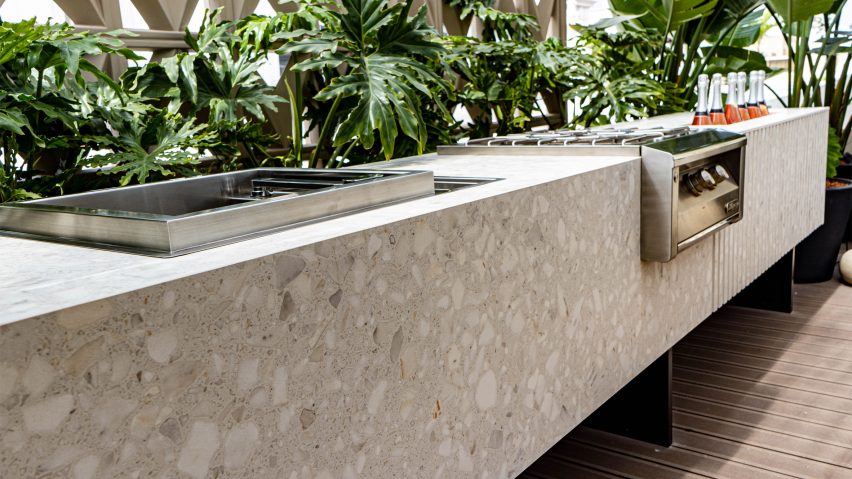Dezeen promotion: from sustainable materials to the rise of terrazzo, Spanish sintered stone manufacturer Neolith has released a breakdown of the trends that are set to dominate surface design in the year ahead.
The list was compiled after the brand spent a year on the design fair circuit, chronicling the latest innovations and common themes across interior and exterior surfaces.
According to Mar Esteve Cortes, director at Neolith, the first major trend the team noticed was a shift towards technical, protective coatings that enhance the performance of different materials.
"With increasingly strict building regulations, 2020 will see a desire for construction materials with inherent properties that actively protect the public inside and outside the home," Esteve explained.
"That includes everything from surfaces which contain anti-slip treatments to Pureti's photocatalytic applications which purify urban air."
This treatment, which has also been explored by NASA to maintain hygiene in space, utilises a natural process called photocatalysis through which plants create energy while trigging a chemical reaction that breaks down organic matter.
When applied to surfaces, this means they stay cleaner for longer, while reducing odours and pollutants in the surrounding air.
Sustainability is a key trend for 2020
As the world wakes up to the threat of climate change, sustainable production is another key trend identified by Neolith, as architects and designers alike are increasingly reaching for low-carbon materials that either have already been recycled or can be in the future.
Popular, more sustainable options include sintered stone – as a wholly natural material created by pressing and firing a mixture of granite, glass minerals and natural oxides – as well as terrazzo, which lends itself to repurposing offcuts that would otherwise have gone to waste.
Terrazzo is another trend in and of itself that Neolith has identified. According to the manufacturer the material continues to be a popular interior choice due to its ability to incorporate a myriad of different colours, grains and patterns.
Flexible working will lead a demand for flexible surfaces
On a practical level, Neolith predicts that the rise of freelance culture and flexible working will result in a demand for surfaces in the home that can serve multiple purposes.
"People will look to furniture and fixtures which can be adapted for both personal and professional use," Esteve said.
"This includes large kitchen islands which can function throughout the week either as a workspace, breakfast bar or a casual dining table for entertaining."
In terms of colours and finishes, Esteve forsees a move towards a moodier palette, with entire rooms styled in different textures and shades of grey.
"Where bright and bold colours dominated 2018, 2019 witnessed a gradual move towards more luxuriant and earthier tones," Esteve continued.
"Expect to see this develop further with richer browns, umbers and ochres contrasted with mossy greens, deep creams and muted blues in 2020."
Contrast and subtle striations will be trends for flooring
Flooring meanwhile is set to be all about contrasts, with simple black-and-white tiles arranged into the kinds of intricate patterns usually found in Florentine palazzos.
With the advent of ever-more sophisticated finishing techniques, it has also become possible for composites such as sintered stone to mimic the qualities of rocks, which usually have to be formed under the earth for millions of years.
This, Neolith predicts, will lead to a move towards subtle striations, like the ones found within otherwise snowy white, quartz-like slabs, as well as towards more distinctive "full-bodied veining".
"After extensive research and development into surface production, we've been able to create profiles which truly capture the deep veining found in marbles, granites and quartzite," said Esteve.
"This adds an element of hyper-realism to the slabs while having superior performance qualities when compared to the original materials."
That goes not just for the look but also for the feel of these materials, which is becoming more and more important to customers.
"Over the last year, we've seen an increase in requests for surfaces with a distinct texture," said Esteve.
"That's why we developed Ultrasoft – a finish that mimics the unique and captivating feel of clean cut, unpolished natural marble."
To find out more about Neolith's surfaces and how they embody the design trends of 2020 visit neolith.com.
Partnership content
This article was written by Dezeen for Neolith as part of a partnership. Find out more about Dezeen partnership content here.

